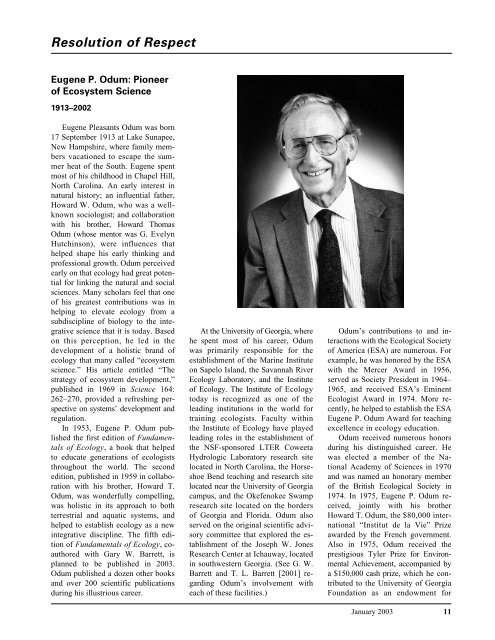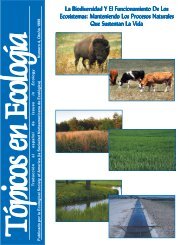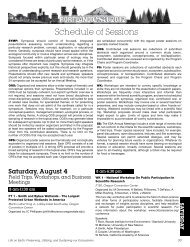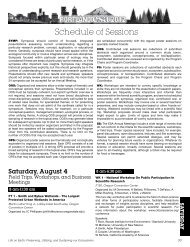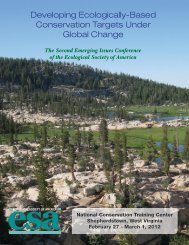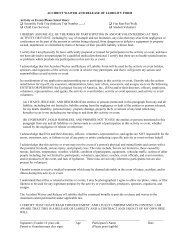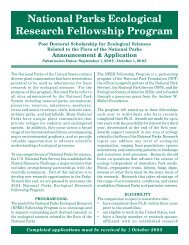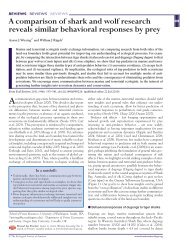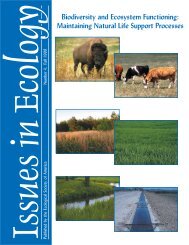Resolution - Ecological Society of America
Resolution - Ecological Society of America
Resolution - Ecological Society of America
Create successful ePaper yourself
Turn your PDF publications into a flip-book with our unique Google optimized e-Paper software.
<strong>Resolution</strong> <strong>of</strong> Respect<br />
Eugene P. Odum: Pioneer<br />
<strong>of</strong> Ecosystem Science<br />
1913–2002<br />
Eugene Pleasants Odum was born<br />
17 September 1913 at Lake Sunapee,<br />
New Hampshire, where family members<br />
vacationed to escape the summer<br />
heat <strong>of</strong> the South. Eugene spent<br />
most <strong>of</strong> his childhood in Chapel Hill,<br />
North Carolina. An early interest in<br />
natural history; an influential father,<br />
Howard W. Odum, who was a wellknown<br />
sociologist; and collaboration<br />
with his brother, Howard Thomas<br />
Odum (whose mentor was G. Evelyn<br />
Hutchinson), were influences that<br />
helped shape his early thinking and<br />
pr<strong>of</strong>essional growth. Odum perceived<br />
early on that ecology had great potential<br />
for linking the natural and social<br />
sciences. Many scholars feel that one<br />
<strong>of</strong> his greatest contributions was in<br />
helping to elevate ecology from a<br />
subdiscipline <strong>of</strong> biology to the integrative<br />
science that it is today. Based<br />
on this perception, he led in the<br />
development <strong>of</strong> a holistic brand <strong>of</strong><br />
ecology that many called “ecosystem<br />
science.” His article entitled “The<br />
strategy <strong>of</strong> ecosystem development,”<br />
published in 1969 in Science 164:<br />
262–270, provided a refreshing perspective<br />
on systems’ development and<br />
regulation.<br />
In 1953, Eugene P. Odum published<br />
the first edition <strong>of</strong> Fundamentals<br />
<strong>of</strong> Ecology, a book that helped<br />
to educate generations <strong>of</strong> ecologists<br />
throughout the world. The second<br />
edition, published in 1959 in collaboration<br />
with his brother, Howard T.<br />
Odum, was wonderfully compelling,<br />
was holistic in its approach to both<br />
terrestrial and aquatic systems, and<br />
helped to establish ecology as a new<br />
integrative discipline. The fifth edition<br />
<strong>of</strong> Fundamentals <strong>of</strong> Ecology, coauthored<br />
with Gary W. Barrett, is<br />
planned to be published in 2003.<br />
Odum published a dozen other books<br />
and over 200 scientific publications<br />
during his illustrious career.<br />
At the University <strong>of</strong> Georgia, where<br />
he spent most <strong>of</strong> his career, Odum<br />
was primarily responsible for the<br />
establishment <strong>of</strong> the Marine Institute<br />
on Sapelo Island, the Savannah River<br />
Ecology Laboratory, and the Institute<br />
<strong>of</strong> Ecology. The Institute <strong>of</strong> Ecology<br />
today is recognized as one <strong>of</strong> the<br />
leading institutions in the world for<br />
training ecologists. Faculty within<br />
the Institute <strong>of</strong> Ecology have played<br />
leading roles in the establishment <strong>of</strong><br />
the NSF-sponsored LTER Coweeta<br />
Hydrologic Laboratory research site<br />
located in North Carolina, the Horseshoe<br />
Bend teaching and research site<br />
located near the University <strong>of</strong> Georgia<br />
campus, and the Okefenokee Swamp<br />
research site located on the borders<br />
<strong>of</strong> Georgia and Florida. Odum also<br />
served on the original scientific advisory<br />
committee that explored the establishment<br />
<strong>of</strong> the Joseph W. Jones<br />
Research Center at Ichauway, located<br />
in southwestern Georgia. (See G. W.<br />
Barrett and T. L. Barrett [2001] regarding<br />
Odum’s involvement with<br />
each <strong>of</strong> these facilities.)<br />
Odum’s contributions to and interactions<br />
with the <strong>Ecological</strong> <strong>Society</strong><br />
<strong>of</strong> <strong>America</strong> (ESA) are numerous. For<br />
example, he was honored by the ESA<br />
with the Mercer Award in 1956,<br />
served as <strong>Society</strong> President in 1964–<br />
1965, and received ESA’s Eminent<br />
Ecologist Award in 1974. More recently,<br />
he helped to establish the ESA<br />
Eugene P. Odum Award for teaching<br />
excellence in ecology education.<br />
Odum received numerous honors<br />
during his distinguished career. He<br />
was elected a member <strong>of</strong> the National<br />
Academy <strong>of</strong> Sciences in 1970<br />
and was named an honorary member<br />
<strong>of</strong> the British <strong>Ecological</strong> <strong>Society</strong> in<br />
1974. In 1975, Eugene P. Odum received,<br />
jointly with his brother<br />
Howard T. Odum, the $80,000 international<br />
“Institut de la Vie” Prize<br />
awarded by the French government.<br />
Also in 1975, Odum received the<br />
prestigious Tyler Prize for Environmental<br />
Achievement, accompanied by<br />
a $150,000 cash prize, which he contributed<br />
to the University <strong>of</strong> Georgia<br />
Foundation as an endowment for<br />
January 2003 11
the Institute <strong>of</strong> Ecology. In addition<br />
to other endowments at the University<br />
<strong>of</strong> Georgia, such as the Odum<br />
Chair in Ecology and the Odum Annual<br />
Lecture series, he was essential<br />
in establishing endowments at the<br />
University <strong>of</strong> North Carolina, the<br />
University <strong>of</strong> Virginia, and the University<br />
<strong>of</strong> Illinois. In 1978, Odum received<br />
the Distinguished Service Award<br />
from the <strong>America</strong>n Institute <strong>of</strong> Biological<br />
Sciences. In 1987, with his<br />
brother Howard, Odum received the<br />
Royal Swedish Academy’s Crafoord<br />
Prize, which is <strong>of</strong>ten considered to be<br />
equivalent to the Nobel Prize. Odum<br />
has received Distinguished Alumni<br />
awards from both <strong>of</strong> his alma maters,<br />
the University <strong>of</strong> North Carolina<br />
(A.B. 1934, A.M. 1936) and the<br />
University <strong>of</strong> Illinois (Ph.D 1939).<br />
The mentor for his doctorate was S.<br />
Charles Kendeigh.<br />
Odum remained a vibrant individual<br />
and pr<strong>of</strong>essionally active until<br />
his death on 10 August 2002 at the<br />
age <strong>of</strong> 88. Although he <strong>of</strong>ficially “retired”<br />
in 1984, he continued to publish<br />
books and scientific publications,<br />
and to give invited lectures at symposia<br />
and special events. (See his biography,<br />
Eugene Odum: Ecologist and<br />
Environmentalist by B. J. Craige [2001].)<br />
A competitive tennis player in his<br />
youth, he became a worthy opponent<br />
on the croquet court in his later years.<br />
He remained an avid bird watcher and<br />
enthusiastic gardener. He was a friend<br />
to colleagues and students alike, and<br />
a generous individual whose gifts and<br />
wisdom will promote ecology beyond<br />
his death.<br />
12 Bulletin <strong>of</strong> the <strong>Ecological</strong> <strong>Society</strong> <strong>of</strong> <strong>America</strong><br />
Literature cited<br />
Barrett, G. W., and T. L. Barrett.<br />
2001. Holistic science: the evolution<br />
<strong>of</strong> the Georgia Institute <strong>of</strong><br />
Ecology (1940–2000). Taylor and<br />
Francis, New York, New York,<br />
USA.<br />
Craige, B. J. 2001. Eugene Odum:<br />
ecosystem ecologist and environmentalist.<br />
University <strong>of</strong> Georgia<br />
Press, Athens, Georgia, USA.<br />
Gary W. Barrett,<br />
Odum Pr<strong>of</strong>essor <strong>of</strong> Ecology<br />
Institute <strong>of</strong> Ecology<br />
University <strong>of</strong> Georgia<br />
Athens, GA 30602<br />
E-mail:<br />
gbarrett@sparrow.ecology.uga.edu


